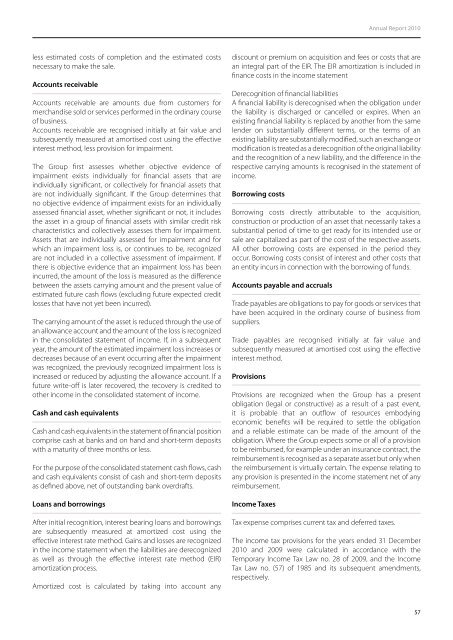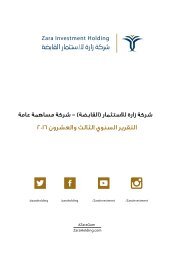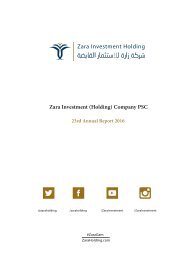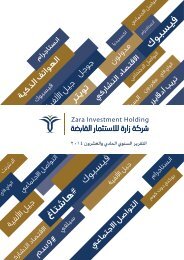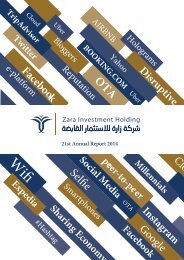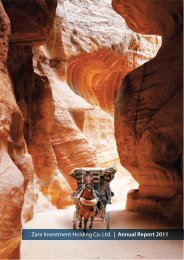ZaraAnnual-English2010
You also want an ePaper? Increase the reach of your titles
YUMPU automatically turns print PDFs into web optimized ePapers that Google loves.
Consolidated Financial Statements | Notes To The Consolidated Financial Statements December 31, 2010 Annual Report 2010<br />
Deferred tax is provided on temporary differences at each<br />
reporting date between the tax bases of assets and liabilities<br />
and their carrying amounts for financial reporting purposes.<br />
Deferred tax assets and liabilities are measured at the tax rates<br />
that are expected to apply in the period when the asset is<br />
realized or the liability is settled.<br />
The carrying values of deferred income tax assets are reviewed<br />
at each reporting date and reduced to the extent that it is no<br />
longer probable that sufficient taxable profit will be available to<br />
allow all or part of the deferred income tax asset to be utilized.<br />
Revenue recognition<br />
Revenues are recognized upon rendering services and issuance<br />
of invoice.<br />
Dividends are recognized when the shareholders’ right to<br />
receive payment is established.<br />
Other revenues are recognized on an accrual basis.<br />
Operation lease<br />
Group as a lessee<br />
Operating lease payments are recognised as an expense in the<br />
consolidated statement of income on a straight-line basis over<br />
the lease term.<br />
Group as a lessor<br />
Operating lease revenue from investment properties are<br />
recognised as other income in the consolidated statement of<br />
income on a straight-line basis over the lease term.<br />
Foreign currency<br />
Foreign currency transactions during the year are recorded<br />
using exchange rates that were in effect at the dates of the<br />
transactions. Assets and liabilities denominated in foreign<br />
currencies are translated to Jordanian Dinars using the<br />
prevailing exchange rates at year end. Foreign exchange gains<br />
or losses are reflected in the consolidated income statement.<br />
Contingencies<br />
Contingent liabilities are not recognized in the consolidated<br />
financial statements. They are disclosed unless the possibility<br />
of an outflow of resources embodying economic benefits is<br />
remote.<br />
A contingent asset is not recognized in the consolidated<br />
financial statements but disclosed when an inflow of economic<br />
benefit is probable.<br />
2.4 Changes in accounting policies and<br />
disclosures<br />
The accounting policies adopted are consistent with those<br />
of the previous financial year, except for the following new<br />
and amended IFRS and IFRIC interpretations effective as of 1<br />
January 2010:<br />
IFRS 2 Share-based Payment: Group Cash-settled Sharebased<br />
Payment Transactions<br />
IFRS 2 Share-based Payment (Revised)<br />
The IASB issued an amendment to IFRS 2 that clarified the<br />
scope and the accounting for group cash-settled share-based<br />
payment transactions. The Group adopted this amendment as<br />
of 1 January 2010. It did not have an impact on the financial<br />
position or performance of the Group.<br />
IFRS 3 Business Combinations (Revised) and IAS 27<br />
Consolidated and Separate Financial Statements<br />
(Amended)<br />
IFRS 3 (Revised) introduces significant changes in the accounting<br />
for business combinations occurring after becoming effective.<br />
Changes affect the valuation of non-controlling interest, the<br />
accounting for transaction costs, the initial recognition and<br />
subsequent measurement of a contingent consideration and<br />
business combinations achieved in stages.<br />
These changes will impact the amount of goodwill recognised,<br />
the reported results in the period that an acquisition occurs<br />
and future reported results.<br />
IAS 27 (Amended) requires that a change in the ownership<br />
interest of a subsidiary (without loss of control) is accounted<br />
for as a transaction with owners in their capacity as owners.<br />
Therefore, such transactions will no longer give rise to<br />
goodwill, nor will it give rise to a gain or loss. Furthermore, the<br />
amended standard changes the accounting for losses incurred<br />
by the subsidiary as well as the loss of control of a subsidiary.<br />
The changes by IFRS 3 (Revised) and IAS 27 (Amended) affect<br />
acquisitions or loss of control of subsidiaries and transactions<br />
with non-controlling interests after 1 January 2010.<br />
The change in accounting policy was applied prospectively<br />
and had no material impact on earnings per share. IFRS 3.64<br />
IAS 39 Financial Instruments: Recognition and<br />
Measurement – Eligible Hedged Items<br />
The amendment clarifies that an entity is permitted to designate<br />
a portion of the fair value changes or cash flow variability of<br />
a financial instrument as a hedged item. This also covers the<br />
designation of inflation as a hedged risk or portion in particular<br />
situations. The Group has concluded that the amendment will<br />
have no impact on the financial position or performance of the<br />
Group, as the Group has not entered into any such hedges.<br />
IFRIC 17 Distributions of Non-cash Assets to Owners<br />
This interpretation provides guidance on accounting for<br />
arrangements whereby an entity distributes non-cash assets to<br />
shareholders either as a distribution of reserves or as dividends.<br />
The interpretation has no effect on either, the financial position<br />
or performance of the Group.<br />
ZARA INVESTMENT COMPANY (HOLDING COMPANY)<br />
NOTES TO THE CONSOLIDATED FINANCIAL STATEMENTS DECEMBER 31, 2010<br />
3.<br />
Significant Accounting Judgment, Estimates And Assumptions<br />
The preparation of the consolidated financial statements requires management to make estimates and assumptions that affect the<br />
reported amounts of financial assets and liabilities and disclosure of contingent liabilities. These estimates and assumptions also<br />
affect the revenues and expenses and the provisions as well as fair value changes reported in equity. In particular, considerable<br />
judgment by management is required in the estimation of the amount and timing of future cash flows when determining the<br />
level of provisions required. Such estimates are necessarily based on assumptions about several factors involving varying degrees<br />
of judgment and uncertainty and actual results may differ resulting in future changes in such provisions.<br />
Judgments, estimates and assumptions in the consolidated financial statements are detailed below:<br />
• A provision will be established for accounts receivable<br />
based on basis and assumptions approved by the Group’s<br />
management to estimate the required provision in<br />
accordance with IFRS.<br />
• The financial year is charged with its income tax expense in<br />
accordance with laws and regulation and IASs. Deferred tax<br />
assets and liabilities and income tax provision is calculated<br />
accordingly.<br />
• The management periodically reviews the useful lives<br />
of property equipment in order to calculate the annual<br />
deprecation charges based on the general conditions of<br />
property and equipment and estimate the future useful<br />
lives accordingly. Any impairment losses of property and<br />
equipment are recognized in the consolidated statement<br />
of income.<br />
• A provision will be established against court cases where<br />
the Group is the defendant based on a legal study provided<br />
by the Group’s legal advisor based on the probability of risks<br />
occurrence. These studies are reviewed periodically and the<br />
provision is adjusted accordingly.<br />
• The management of the Group periodically reviews the<br />
financial assets stated at cost to assess any impairment<br />
loss that may occur. Impairment loss is recognized in the<br />
consolidated statement of income.<br />
58<br />
59


